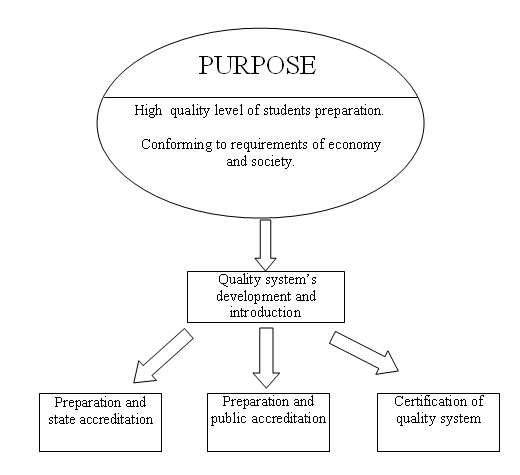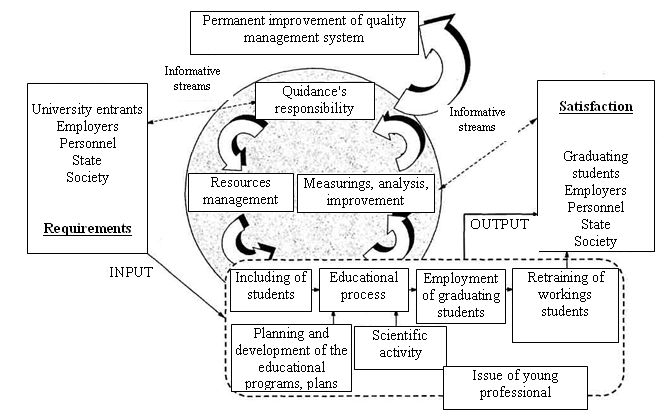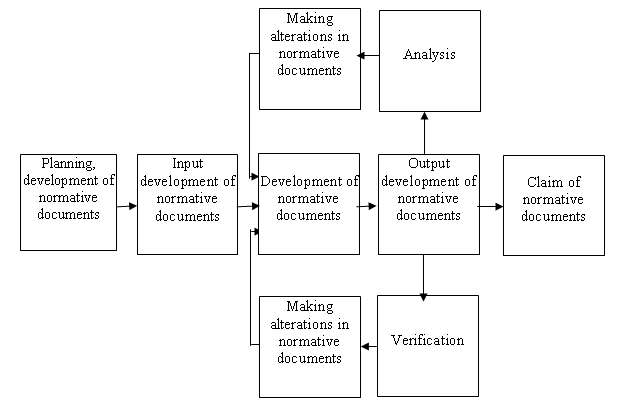
Tupikova Katerina
Master's work theme: "Normative and methodical providing of development and introduction of system quality management in Higher educational establishment "Donetsk national technical university"
Scientific leader: Momot Alexander
Speciality: "Quality, standartization and certificatin"
Department: Quality management, Faculty: Mechanical, year: 2007


430061524



Abstract
Library
Links
Search report
Individual task
DonNTU
DonNTU Masters
Abstract Theme:
"Normative and methodical providing of development and introduction of system quality management in Higher educational establishment "Donetsk national technical university"
Scientific leader: Momot Alexander
Research actuality
By estimations of specialists in XXI the determining competitive edge of enterprises and organizations will be a competence of their personnel.
In the developed countries well understand connection between the competitiveness of economy and level of the national education’s system, the same, directing the efforts on development of this important industry. For this reason for many countries of the world a key question was become by providing of high quality of higher education.
One of the most effective methods of achieving this purpose is the use of ideology’s universal quality (ТQМ) management and international standards of ISO series, based on her 9000 versions 2000 in industry of education. Almost 5 thousands of educational establishments in the whole world inculcated and certified the systems quality management (SQM) in accordance with these standards.
Ukraine put a purpose integration to the world and European economic system. For this purpose she must have the adequate system of higher education, able to answer the modern requirements of globalization, hard competition, informatizations and others like that.
Modern education must prepare specialists the competence of which would confess in outer educational space. Strategy of development of higher education in Ukraine as must absorb the participant of the Bolongna process in itself world tendencies of transformation essence and methods of modern higher education, which in many developed countries became accelerating of the economy growing, instrumental in satisfaction of growings necessities and opening of creative potential personality, provided introduction of new technologies of information’s. For today Ukrainian education to a certain extent falls behind on questions of introduction of front-rank principles which characterize world educational space. It can one of explaining this fact be to, that the process of reformation of domestic high school restrains temper from application, insufficient use of organizational innovations and progressive forms of management, establishments of formation of old methods of management, which are based on principles of ТQМ. It, in same queue, is explained insufficiency of necessary methodical recommendations and scientific developments on introduction of the control quality systems in higher education, which take into account the specific of this industry.
Exactly now the problem of upgrading stands on the first place, in fact graduating students are the future of our country, therefore development and introduction of SQM in DonNTU is one of the most actual questions, and to begin, to my mind, stands exactly from the normative and methodical providing, as it will allow to provide the stable issue of competent specialists, conscious members of society, will provide an improvement in a structure and management, will promote the productivity, will optimize charges, will fix an image and will strengthen positions of DonNTU at the market of educational services.
World experience
From the beginning of 90th of the XX, above all things in the USA and Japan [1], methodology of ТQМ began to be used in industry of higher education. Hundreds of universities of the developed countries of the world are the USA, Canada, Italy, France, Great Britain, Spain, Netherlands, Australia and many other, and also countries which develop, — to Korea, Malaysia, Taiwan, Poland, Slovenia and others like that, began actively to inculcate principles of ТQМ in the activity. The result of it was become by the increase of students progress, improvement of quality on-line tutorials, expansions bringing in of teaching staff and personnel of Institute of higher to growth of demand on graduating students [2]. In 1990 78 American institutes reported that they studied and try to inculcate principles of ТQМ. In three years them already it was more than 180, and in 1994 over 200 American universities in a toy or other form used principles of upgrading ТQМ. Among the American universities which attained substantial progress due to introduction of principles of ТQМ, there were such Institutes of higher, as Oregonian, Delaware, Virginian, Arizonan, Chicago, Maryland, Rochester and others like that.
The analysis of similar practice in Great Britain in the middle of 90th of the XX witnessed, that its universities comparatively with American had appeared more flexible in relation to introduction of innovations. Most successes in relation to introduction of principles of ТQМ were attained by the universities of Aston, Lids, Wolverhampton, Newcastle and others like that.
Noteworthy there is experience of a Russian Federation in industry of higher education, as processes which took place the last years at Russian high school to a great extent were inherent to Ukrainian educational industry.
As marked in labour [3], quality of higher education goes down in Russian Federation. A competition at the market of educational services is intensified at the same time, and it can induce Russian Institutes of higher to search ways for upgrading preparation of graduating students. The problem of quality of education found a reflection in "Conception of modernization of Russian education on a period to 2010 year". The Russian specialists in industry of higher education search the ways of its further development, attentively study world experience, in particular, introduction of principles of ТQМ, standards of ISO 9000 and models of business perfection. In labour [4] the example of introduction in 1999 of the system of management of quality is resulted in the Tomsk polytechnic university, which at the end of 2001 was certificated on accordance the standard of ISO 9001. The model of the system of evaluation of quality of educational process is offered on the basis of the system and process approaches. Another example of construction of the system of quality in Institute of higher is experience of the Tula state university [5, 6]. The system engulfs the life cycle of preparation of specialists, which consists of eight stages.
On being in a middle in 2003 in Russian Federation inculcated and certificated eight systems of quality, in particular in to Tomsk polytechnic university, Tula state university, Saint Petersburg university of design and technologies and Saint Petersburg financial university, Kuban agrarian university, Siberian university of ways of report, Far-Eastern academy of economy and management, in 10th inculcated, and in 18th are on the stage of development.
For today 997 higher educational establishments, among which 130 universities, 63 academies, 137 institutes, 169 colleges, 301 technical school, 197 schools of all patterns of ownership, which carry out preparation after 76 directions and over by 700 specialities, are counted in Ukraine.
Practice testifies that measures related to state accreditation are not sufficient, as even implementation of all requirements of legislation and State standard of education Institute of higher is not guaranteed high quality of education and, in essence, are minimum which provide passing to the students of certain volumes of information and knowledges. At the same time of growth of competition at the market of services of higher education both between state and commercial Institutes of higher and between Ukrainian and foreign establishments, and also row of negative factors, related to reduction of amount of university entrants (a common amount of the licensed set is 502 thousands of university entrants, thus for today in Ukraine a birth-rate is not exceeded by 400 thousands on a year), forces Institutes of higher to search the new ways of upgrading higher education and preparation of graduating students [7]. By the state on May in 2005 926 certificated systems of quality were incorporated in Ukraine. And in industry of higher education two systems are certificated for today: Kiev university of economy and right for "KROK" and Institute of investment management.
Requirement to the normative providing of SQM activity
In accordance with an item 22 Laws of Ukraine "On higher education" [8] of activity of Institute of higher a primary purpose are providing of terms, necessary for the receipt of higher education a person, preparation of specialists for the necessities of Ukraine. Main tasks of Institutes of higher are realization of educational activity which corresponds the standards of higher education, scientific and scientific and technical, creative, artistic, cultural and educational, sporting and health activity, training of scientific and scientifically-pedagogical personnel’s, and also providing of cultural and spiritual development of personality and state ordering and agreeing fulfillment, to preparation of specialists, studies of demand on separate specialties at the market of labor and assistance employment.
The process of high-quality preparation of specialists organizes and controls the state by the complex evaluation of Institutes of higher, using procedures of licensing of educational activity, accreditation of directions, specialties and Institute of higher on the whole [9] and to state attestation of graduating students.
Analysis and comparison of requirements which institute of higher must execute during accreditation and licensing testifies to their likeness with principles of ТQМ and standards of ISO 9000, above all things, by an orientation on the necessity of society and other interested parties, necessity of training of highly skilled personnels, organization of process of set, employments of students and others like that.
In this sense the system of quality on the basis of principles of ТQМ is an effective instrument for achieving a purpose and main tasks activity of Institute of higher, and also successful passing of procedures of licensing and accreditation. Thus, if DonNTU puts a purpose achieving the high level of quality of preparation of graduating students by development, introduction and certification of the own system of quality, system requirement quality management, set in DSTU ISO 9001:2001 are inalienable and obligatory for implementation. It touches, in particular, and requirements to the document.
So, by a point 4.2 standard of DSTU ISO 9001:2001 the obligatory volume of document, which must be developed, inculcate and support in an kind, is certain (pic.1).

Picture 1 - Obligatory volume of document
It is necessary to take into account that development of document of Institute of higher is a not end in itself, but mean for achieving the primary purposes of DonNTU. On a picture 2 the model of the system of quality of DonNTU is represented on the basis of eight key processes which his activity consists of.

Picture 2 - Key processes of activity
In accordance with positions of ISO 9000 every organization determines the volume of necessary document independently. Thus, coming from the large general volume of necessary document and certain Institute of higher priorities, it is expedient to give mind on the more working-out of separate documents, which will be instrumental in achieving conforming to requirements of legislation, satisfaction of necessities of all interested parties, providing of high quality of preparation of graduating students.
For this purpose it is necessary to define, which one documents will be of interest for those, who will use them in the work. To them it is possible to deliver guidance, personnel of Institute of higher, representatives of organs of state and public accreditation, and also representatives of organs of certification of the systems of quality. In essence, requirements of commons to the document of Institute of higher from the side of its "users" it is needed to transform in the list of concrete documents, determining their rating here, that importance.
Development of normative documents must become the next phase of work. It is expedient to build a development of documents of the system of quality process in accordance with a method, expounded in 7.3 the International standard of ISO 9001:2000. A flow-chart is resulted on a picture 3.

Picture 3 - Chart of development of the quality system process
On results the conducted researches it is possible to draw certain conclusions:
1.To recommend to application in higher educational establishments which put a purpose achieving the high level of quality of the graduating students by procedures of accreditation and certification, classic method of management of quality for creation of the effective normative providing.
2.To use in DonNTU offered in ISO 9001:2000 approach in relation to development of normative documents taking into account the proper specific.
3.The normative providing of Institute of higher must be flexible, adapted to the necessities of situation, and also such, which will allow not only to answer the requirements of regulators but also assist steady economic development of organization.
Literature
1. Джордж С, Ваймерскирх А. ТQМ Всеобщее управление качеством. — СПб., 2002. - 252 с.
2. Подсыпанина Т. Эффективность и качество бизнес-образования // Бизнес-образование. — 2003. — № 1(14). — С. 184-195.
3. Ильинский И. Качество — ядро образовательного процесса // Стандарты и качество. — 2002. — № 4. — С. 22—24.
4. Рузаев Е., Погребняк С, Клеников А. и др. Томский политехнический институт: система менеджмента качества // Стандарты и качество. — 2002. — № 4. – С. 61 - 63.
5. Фролов В., Протасьев В., Шильдин В. Принципы построения систем качества в образовательных процессах // Стандарты и качество. — 2002. — № 4. — С. 41, 42.
6. Спиридонов 9., Савина Е. Разработка модели системы качества ВУЗа // Стандарты и качество. — 2002. — № 4. — С. 46, 47.
7. Віткін Л. Візьміться за впровадження міжнародної системи якості стандарту 150 9000 // Синергия. — № 1(5). — С. 8 — 11.
8. Закон України "Про вищу освіту" від 17 січня 2002 року № 2984 — ІП.
9. Шадриков В., Геворкян Е., Калабин С. и др. О процедуре комплексной оценки ВУЗа// Высшее образование в России. — 2001. — № 1. — С. 29-38.